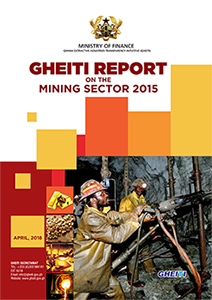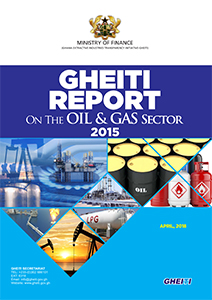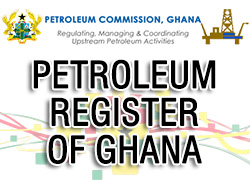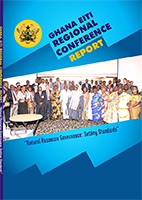| First EITI Audit Report on Ghana’s Oil Set for this Year |
 |
 |
 |
|
By Frederick Asiamah Ghana is set to produce its first report on payments of taxes by oil companies to government under the Extractive Industries Transparency Initiative (EITI) this year. Mr. M. Bashiru Abdul-Razak of the Ghana EM (GHEITI) Secretariat, who disclosed the information at a meeting in Accra, also hinted Public Agenda that managers of the process anticipate that the aggregator (consultant" would complete his work by August, allowing for the launch or the report before the close of 2012. So far, the Terms of Reference (ToR) for the exercise has been developed, and an evaluation process of tenders for the assignment completed. An aggregator is to be selected in the coming weeks to pave the way for data collection and collation. This must be exciting news for many civil society activists and proponents of transparency and accountability who will expect that the report will provide answers to questions which are still being asked about oil marketing contracts between the jubilee partners (Tullow and others operating the jubilee field) and companies marketing their share of oil from jubilee. The marketing contracts are deemed to have huge influence on the profit margins of the companies and the consequent taxes they would pay to the government. The EITI process and its impact in resource revenue management in Ghana were discussed within the context of transparent management of resource revenues at Monday's meeting which was held by the Friedrich Ebert Stiftung (FES), a German political foundation, in Collaboration with the Coalition on Human Rights, Oil and Gas (CHROG), a pressure group. The forum allowed Dr Barbel Kofler, a German Member of Parliament representing the Social Democratic Party (SPD), to interact with members of the Ghanaian civil society operating in the oil and gas sector, and share ideas, experiences and best practices. She told participants that she was visiting Ghana to learn at first-hand about the goings-on in Ghana since oil discovery in 2007, and how transparently revenues were being managed for sustainable development. Ghana is one of the countries receiving donor support from Germany. The German Development Cooperation (formerly GTZ) has been the main channel for support to government and sometimes to civil society while the FES has also been supporting some civil society efforts. During the visit, which spanned 16th to 21st February, 2012, Dr Kofler also had opportunity to engage with stakeholders in the education sector as well as those involved in the national budget process. Her visit comes at a time Ghana is being governed by a social democratic party - the National Democratic Congress (NDC). EITI in Ghana The EITI in turn has contributed to many policy decisions following revelations in the various reports of loopholes in the revenue collection system, necessitating new measures taken by government including reviewing mineral royalty rate from a range of 3-6% to a fixed rate of 5%, and re-negotiating contracts. Many Ghanaians, including Deputy Minister of Finance and Economic Planning, Hon. Seth Terkpeh, agree that over the years the nation has not made maximum gains from the sector. "Our country has failed to translate its mineral wealth into broad economic development. Transfers from the sector to the economy as a whole have been particularly disappointing because of several factors, including our inability to operationalise the Minerals and Mining Act to our advantage, by accepting the lower end of the 3-6% range over the years, provision of generous tax incentives, carry forward of losses, accelerated depreciation etc." These were the candid views of the deputy minister, expressed in a statement read on his behalf by the Chief Director of the Ministry of Finance, Mr. Enoch Cobinah at the launch of the 7th GHEITI report. There is also concern that the inability to derive maximum benefit from the mining sector is compounded by a lack of capacity to critically monitor production figures, cost of production, profits and tax assessment as well as auditing of various processes. The latest report, which covers 2009, made some critical findings including missing periods in the disbursement of funds by the Offices of the Administrator of Stool Lands (OASL) to District Assemblies and low rate of ground rent paid by mining companies; which have reflected in all the EITI reports since 2004. Other significant findings of the reports are that Gold Fields Ghana Limited which had paid corporate tax for over a period of five years did not pay any corporate tax in 2009 due to capital allowance resulting from the acquisition of fixed assets. Corporate tax receipt may be difficult to be budgeted for as it is heavily impacted upon by the acquisition of fixed assets. The report recommended that there should be information on the development plans of extractive companies in order for the government to effectively plan on its revenues and using a capital allowance regime which allows writing the cost over at least five years. |










